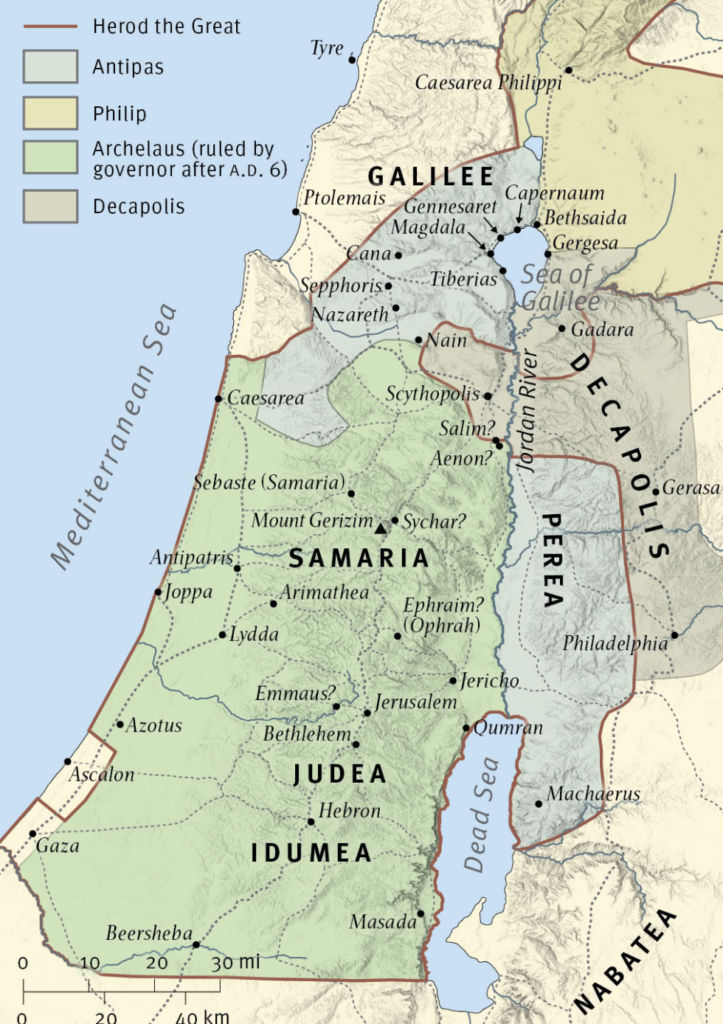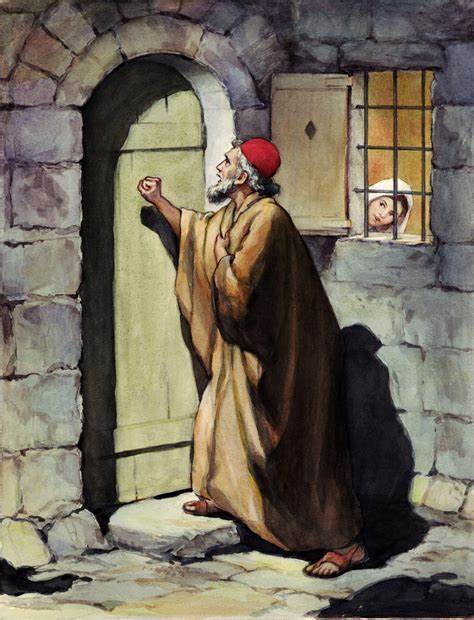Theology Matters: Why Dispensationalism Is Not Christian and Is Bad for White Americans, Part 2
Posted By Morris van de Camp On In North American New Right | Comments Disabled2,594 words
Part 2 of 2 (Part 1 here [2])
The Damnatio Memoriae of Lucius Aelius Sejanus and the Jews of the Roman Empire
During Jesus’ ministry, the Emperor of Rome was Tiberius Caesar, but the government of Rome was administered by Lucius Aelius Sejanus [3]. Pontius Pilate, a client of Sejanus and the husband of Ceasar Augustus’ granddaughter [4], was Governor of Judea. Herod Antipas was the tetrarch [5] of Galilee. Under Pontius Pilate and Herod, the ethnonationalist Jews were suppressed from acting on their worst instincts.
Jesus was probably part of a wider religious reform movement, one in which John the Baptist was either the founder or the most prominent spokesman. John the Baptist was executed for criticizing Herod, even though Herod saw value in his movement’s message. Herod may have supported Jesus’ ministry in order to coopt John the Baptist’s larger reform movement in order to eliminate future criticism while diminishing the power of the ethnonationalist, anti-Hellenist Jews. One of Jesus’ funders was Joanna, the wife of Chuza, Herod’s household manager [6]. Jesus was connected through Joanna to Herod’s power structure.
The message of Jesus is found in the New Testiment. I’ll simplify Jesus’ message and ministry as follows: Jesus rejected the hairsplitting and legalism of the ethnonationalist Jews, which consisted of several sects. The two most prominent were the Pharisees and the Sadducees. Jesus’ initial goal was probably to reform Judaism by focusing on Old Testament law rather than on the hairsplitting and legalism which became the Talmud. The Talmud hadn’t yet been created — that would come a few decades later — but the impulse is clearly there during Jesus’ ministry. He was also sympathetic to Hellenist Jews and tolerant of Gentiles.
Jesus lived in Galilee, which was populated by many non-Jews. He eventually realized that he was attracting many Gentile followers, including Roman military officers, so he expanded his ministry. It is possible that Luke was one of the Gentiles sent to spread Christ’s message in the mission of the 72 described in Chapter 10 of the Gospel of Luke to those areas east of the Jordan River.
 [7]
[7]In the Gospel of Luke, 72 missionaries travel to the Greek-speaking areas east of Jordan. It is clear that the target of this mission was Gentiles, not Jews, when Jesus told the missionaries that “into whatsoever city ye enter, and they receive you, eat such things as are set before you.” (Luke 10:8 KJV [8])
Jesus also encouraged his disciples to arm themselves [9], and they were carrying swords [10] when Jesus was arrested. The fact that Jesus went about with armed disciples further shows the legal status of his religious ideas. A band of 12 or more armed men could not have fought off the Roman forces, but they could have stopped an attack by the ethnonationalist, anti-reform Jews – provided that those Jews were not being backed by state authority.
The Christian liturgical calendar holds that Jesus entered Jerusalem a week prior to his execution and resurrection, but the Bible doesn’t say how long Jesus was in Jerusalem. It is possible that he arrived during the Feast of the Tabernacles, because he was greeted with supporters carrying palm branches, which was a custom of that holiday. Tabernacles falls roughly six months before Passover, when Jesus was executed; the Last Supper therefore might not have been a Passover dinner.
 [11]
[11]You can buy Jonathan Bowden’s Pulp Fascism here [12].
Jesus and his disciples’ journey to Jerusalem was an attempt to take his message of reform to the heart of ethnonationalist Judaism. At first Jesus continued to have the support of the government. This is shown by the fact that Jesus was not immediately arrested for overturning the money-changing tables in the Temple. There was a Roman military garrison nearby, and a place where so much cash was present would certainly have had its own security force as well. His protest was just that: a symbolic act encouraging spiritual reform rather than a robbery.
As I wrote at the outset, theology matters, and Dispensationalist theology has led America along a wrong path. The Jews of Jesus’ time recognized that Jesus’ theology mattered and that it was a threat to them, so they decided to kill him, but they were unsure how the Romans would respond to the Jewish authorities murdering a Jewish subject of the Roman Empire over a theological dispute.
The ethnonationalist Jews therefore worked to have Jesus executed by the Roman authorities. Tiberius and Sejanus [13] unfortunately had a falling out, and Sejanus was executed. This left Pilate in a weak political position, and this affected local politics in Judea. Before Sejanus; death, Pontius Pilate wouldn’t have allowed a Jewish-influenced kangaroo court to be set up for a Jewish religious reformer. But given his weakened political position, neither he nor Herod Antipas felt they had the political strength to oppose the organized Jewish community of their time. This makes their indecisiveness easier to understand. Additionally, Jesus’ trials didn’t occur on a Thursday night, but rather over the course of the weeks leading up to Passover during regular business hours, with scribes recording the proceedings.
Herod and Pilate don’t view Jesus as a criminal, but they understood that a powerful faction was looking to kill him. Pilate attempted to free Jesus by offering “the people” a choice to either free Jesus or a common criminal, as was part of the Passover tradition. But the ethnonationalist Jews were one step ahead, and “the people” who were assembled by the Jews called for Jesus’ crucifixion.
Most Christian interpretations of this event say that Pilate feared a riot, but this would have allowed him to call in the Roman army, thus deciding the matter in his favor by the sword. Pilate’s problem was that the organized Jewish community of his time would have sent messages to Tiberius claiming that Pilate was disloyal. Given that Pilate was a client of Sejanus, such charges of disloyalty would have been believed.
The Normalization of Deviance and the Council of Jerusalem
Christian doctrine of all denominations holds that the crucifixion of Jesus was part of a divine plan for the salvation of humanity. As a result, many practicing Christians view the role of the various players involved in it as morally neutral pawns in a divine game. But take the “divine plan” out of the story, and the affair becomes one of injustice, as well as a textbook example of a common modus operandi that Jews have always used to unjustly get their way.
In this case, the Jews got their way by threatening the career and life Pontius Pilate by threating to claim he is disloyal to Emperor Tiberius. Given the recent downfall of Sejanus, this threat is serious. The Jews make this threat so that he will carry out a legal murder of someone whose ideas they dislike, but cannot refute. Once Pilate “washes his hands” of the matter, the precedent is set for the organized Jewish community to simply kill any non-Roman citizen who preaches the ideology of Christ. Saint Stephen [14] is accused of the same crime as Jesus, but Stephen [15] didn’t get a trial in either Herod or Pilate’s courts. He was tried in an extralegal Jewish tribunal and immediately stoned to death. Revilo [16] Oliver’s [17] claim that Paul “Judaized” Rome [18] doesn’t square with what happens in the New Testament. The Apostle Paul was barely a step ahead of the Jews throughout his career, and it is highly probable that Jewish influence on Nero is what caused Paul to be executed in Rome. And it was John Nelson Darby who “Judaized” Anglo culture.
This unjust behavior is the normalization of deviance [19]. It’s an engineering term for a flaw in a system that can bring about a catastrophe under the right circumstances, but which nobody recognizes until it is too late. The killings of Jesus and Stephen are not documented anywhere other than the Bible, but undoubtedly Jews were exhibiting this sort of behavior with every Roman official they dealt with. Eventually, the antibodies built up, and no Roman bureaucrat, mid-grade military officer, senator, and so on as going to believe any Jew’s word or be concerned with what Jews viewed as important. And men of those ranks are harder to replace than a Governor with an unstable relationship with the Emperor. Thus, within four decades after the crucifixion of Christ, a dispute over the location of Greek sacrifices in Caesarea spiraled into an apocalyptic war that ended in the destruction of Jerusalem and the Jewish Temple.
The threat to the early Christian Church was not just physical; there was also the threat of the Judaization of Christianity. Many, but not all, of the leadership of the Early Christians were ethnic Jews, and there was controversy over whether or not Gentile converts were required to undergo circumcision, follow Jewish dietary restrictions, and follow the laws of Moses. The Judaizers also sought to create a hierarchical religion in which ethnic Jews would be at the top, even in a spiritual sense. The Judaizers were so powerful that even a decade after the crucifixion, the early Church Fathers remained uncomfortable eating non-kosher food or breaking bread with Gentiles.
 [20]
[20]Paul rebukes Peter for refusing to break bread with the Gentiles at Antioch in the presence of the Judaizers.
When Peter went to Antioch to visit the church there, he initially ate with the Gentiles, but withdrew when the Judaizers arrived. Paul admonished Peter in Galatians [21] for this. This admonishment could have caused a rift between the two men, but Peter comes around to Paul’s point of view. In Acts, Peter has a vision in which he is shown that it is acceptable to eat non-kosher food. After the vision, he meets a Roman Centurion and his party, who he then converts.
 [22]
[22]You can buy Julie Howard-Hobson’s I do not belong to the Baader-Meinhof Group, here. [23]
The Judaizers were defeated at the Council of Jerusalem, as described in Acts, Galatians, and Hebrews. The most important passage about the Council is Galatians 3:28 [24]: “There is neither Jew nor Greek, there is neither bond nor free, there is neither male nor female: for ye are all one in Christ Jesus” (KJV). This passage has nothing [25] to do with integrated schools or busing [26]; its primary purpose is to eliminate the Judaizers’ influence. The final blow against the Judaizers comes in the Gospel of John, where John the Apostle definitively separates Christians from Jews.
Christian Zionist ministers such as John Hagee [27] overturned the outcome of the Council of Jerusalem [28]. Hagee has even made a point of saying that “the only theology God ever created was Judaism.”[1] [29] Although Hagee claims to be a Christian, what he preaches is a Shabbos goy version of Dispensationalism that rejects both the message of Christ and the New Testament. Genuine Christian believers are also deceived by mountains of pulp prophecy fiction such as the Left Behind series, which are all derived from Dispensationalist theology and boil down to “obey the Jews and support modern Israel, and everything will turn out all right, because Christ’s Second Coming is just around the corner.”
Dispensationalism is similar to Negro worship. Both began to appear in the 1830s, during the Second Great Awakening. The events which flowed from these theologies manifested themselves began to appear at around the same time also: the foundation of Israel occurred in 1948, the same year that the Democratic Party took on “civil rights [30]” at its national convention. The Anglican cathedral in Zanzibar is filled with the graven images of Negro worship, and in 1964, sub-Saharans massacred the Arabs who had lived and ruled there for centuries. This massacre occurred in the same year that the United States was shackled with its illicit second constitution [31], the 1964 Civil [32] Rights [33] Act [34]. American cities burned in 1967 due to the empowerment of sub-Saharans. In the Middle East that same year, Israel won and occupied vast swaths of territory and attacked the USS Liberty [35], and got away with it.
The Descendants of Rhoda
Dispensationalist theology is generally on the wane, but many institutions which Dispensationalist ministers founded in the past remain powerful. The contradictions between Dispensationalism and Christianity’s internal logic is finally being noticed by some ministers, however. Additionally, it is difficult to continue to believe the Second Coming is right around the corner when so many predictions regarding “Babylon” (Iraq), the “anti-Christ” (Saddam Hussein, Osama bin Laden, etc.), and the Second Coming have failed to be fulfilled.
The appalling treatment of the Palestinians [36] is difficult for Christians to continue to ignore. Approximately 20% of the Palestinian people [37] are Christians [38]. Palestinian Christians are declining in the Levant, but not because they are being targeted by Palestinian Muslims.[2] [39] In Bethlehem, the most significant historical Christian village, Palestinian Christians live in a prison [40] created by Israeli Jews. Palestinian Christians who can flee do so, where they are warmly embraced by Christians in the West, but their emigration from Palestine is a form of slow genocide. Even well-heeled Christian tourists [41] are pushed around by Israeli [42] Jews [43].
In the West, the story of the Christian Founders has been interpreted as one of celibate men living largely solitary lives. However, it is certain that they were surrounded by a thriving community of people who had children and grandchildren, and they may have had children and grandchildren themselves. The Apostle Paul, for example, had at least one nephew who supported his ministry [44].
One of the ordinary people among the early Christians was a young servant girl named Rhoda. When Peter escaped from prison, he knocked on the door of the house where Rhoda was a servant. In her excitement, she told the others that Peter was at the door, but leaves him outside. This causes some confusion, but eventually, Peter is allowed in.
There are entire sermons that overthink the story of Rhoda. It’s really just a funny story, and the early Christians must have laughed about it for years. They also certainly wept tears of joy when she was married. If she had descendants, they are Palestinians now, and some of them could be Christians.
While I recognize that Arabs, and especially Muslims, are not always the best people to have around, one can look at the situation in Palestine and recognize that what is going on is a moral travesty even if one has no religion. It is time to end America’s support for Israel.
I’ll end with a quote from Archbishop Alexis of Tiberias [46], who is currently in besieged Gaza:
As long as there is at least one Christian in the territory of Gaza, I will not go anywhere, because I can be a hope for them, so I will stay in the province that believes in me. If I die, I will have a dignified death as my destiny!
Indeed, John Nelson Darby’s lingering Dispensationalist theology shows that the evil that men do lives on after them. The good is oft interred with their bones.
Bibliography
Joseph M. Canfield, The Incredible Scofield and His Book (Chalcedon/Ross House Books, 2005)
David Padfield, Lucius Aelius Sejanus: A Silent Influence at the Trial of Jesus (Zion, Ill.: Self-publish [47]ed, 2021)
Paul A. Pomerville, The New Testament Case Against Christian Zionism: A Christian View of the Israeli-Palestinian Conflict (Coppell, Tex.: CreateSpace, 2015)
Notes
[1] [48] Paul A. Pomerville, The New Testament Case Against Christian Zionism: A Christian View of the Israeli-Palestinian Conflict (Coppell, Tex.: CreateSpace, 2015), 465.
[2] [49] Even without Israel, Muslim Arabs are a problem for Europeans everywhere. Lothrop [50] Stoddard [51] and Samuel [52] Huntington [53] documented the long history of Islamic aggression against the West. But much of their present hostility is driven by Zionism [54]. Israel pushes Arabs out of the Levant, and Jewish pressure groups in Europe and the US push to let those same Muslim Arabs in [55].

